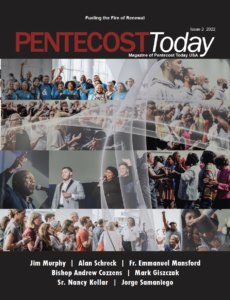The Epiphany of the Lord
Meditation and Questions for Reflection or Group Discussion
Mass Readings:
1st Reading Isaiah 60:1-6
Responsorial: Psalm 72:1-2, 7-8, 10-13
2nd Reading: Ephesians 3:2-3, 5-6
Gospel: Matthew 2:1-12
Allowing Trust in God’s Love and Goodness to Overcome Fears and Doubts
In the days of King Herod, behold, magi from the east arrived. (Matthew 2:1)
Experience tells us that if you wake up expecting that you’re going to have a bad day, then you’ll most likely have a bad day. But if you wake up looking forward to the day, there’s a good chance your day will turn out well. It’s a simple illustration of how our attitudes can affect our behaviors, which then affect the way we deal with all kinds of situations.
Today’s Gospel gives us a striking example of how powerful our predispositions can be. First, we meet King Herod, who is “greatly troubled” by news of Jesus’ birth (Matthew 2:3). Then, we meet the magi, who are “overjoyed” by the exact same event (2:10). Both grasp that a new king has been born, and both are eager to see him—but for different reasons. Herod, insecure about his grasp on power, sees Jesus as a threat and uses deception to try to destroy him. The magi, seekers of wisdom, are excited by the news and hurry to offer royal gifts to the child.
We all can point to ways that fear, envy, or some other negative emotion has colored the way we approach a situation. Instead of remembering that Jesus is always seeking to do us good, we think that he has forgotten us or, worse, that he is punishing us. But if we can face each situation with an open heart, ready to find God’s presence, fear and doubt will begin to melt away. We’ll find Jesus in unexpected, unlikely places—just as the magi found almighty God in the modest home of Mary and Joseph.
So when you are in a moment of fear or doubt, pause, and ask the Holy Spirit to help you find God’s presence. Ask him to help you take on a more open, trusting attitude. As you do, you’ll discover the kind of joy and even awe that the magi felt.
“Holy Spirit, direct my attitude today. Help me to sense your guidance, and fill my heart with your joy.”
Download this reflection with discussion questions here.(Many thanks to The Word Among Us (www.wau.org) for allowing us to use meditations from their monthly devotional magazine. Used with permission.)
Sunday, January 3, 2016
Questions for Reflection or Discussion
- The first reading begins with these uplifting words regarding the coming of Christ: “Rise up in splendor, Jerusalem! Your light has come, the glory of the Lord shines upon you. See, darkness covers the earth, and thick clouds cover the peoples; but upon you the LORD shines, and over you appears his glory. Nations shall walk by your light, and kings by your shining radiance”” (Isaiah 60:1-3). What do these words mean to you? How would you describe the ways that the coming of Jesus (“the light of the world”) has fulfilled these words?
- The first reading goes on to say that “your sons (and daughters) come from afar,” and “you shall be radiant at what you see, your heart shall throb and overflow” (Isaiah 60:4,5). In what ways does your faith in Jesus fill you with the hope these Scriptures reflect? What are some steps you can take in 2016 to increase your faith and hope in the Lord?
- The Responsorial Psalm speaks of a king endowed by God to “govern your people with justice and your afflicted ones with judgment,” and “Justice shall flower in his days” (Psalm 72:2, 7). In addition, the psalm goes on to say that he “shall rescue the poor when he cries out, and the afflicted when he has no one to help him,” “have pity for the lowly and the poor,” and “the lives of the poor he shall save” (72:12-13). In what ways has Jesus fulfilled these words? In what ways have the Church, and you personally, tried to fulfill these words? In 2016, how can you share in this work of Jesus in an even greater way?
- In the second reading, St. Paul tells us of the great mystery that “was made known to me by revelation” (Ephesians 3:2). This wonderful revelation is “that the Gentiles are coheirs, members of the same body,
and copartners in the promise in Christ Jesus through the gospel” (3:6). What does it mean to you that you are now a coheir and copartner with the Jewish people in all the promises fulfilled in Jesus Christ? In what ways do you believe you are called to be a witness of Christ’s love to your Jewish brothers and sisters? How are you doing? How often do you pray for Jewish people whom you know, and for all the Jewish people, that they may one day come to know Jesus as their Messiah and Lord? Are their some specific people that you can pray for right now?
- In the Gospel, there is a great contrast between King Herod’s reaction when the magi inquired of the whereabouts of the “newborn king of the Jews” and the magi’s reaction to finding Jesus. King Herod was “greatly troubled, and all Jerusalem with him” (Matthew 2:3), and the magi “were overjoyed” and “prostrated themselves and did him homage” (2:10, 11). Why do you think there was such a great contrast in their reactions? What is your reaction as you reflect on these events? In what way is it similar to the magi?
- The meditation also compares the reactions of King Herod and the magi, but more importantly it addresses the ways “that fear, envy, or some other negative emotion has colored the way we approach a situation. Instead of remembering that Jesus is always seeking to do us good, we think that he has forgotten us or, worse, that he is punishing us.” The meditation then ends with these encouraging words of advice: “So when you are in a moment of fear or doubt, pause, and ask the Holy Spirit to help you find God’s presence. Ask him to help you take on a more open, trusting attitude. As you do, you’ll discover the kind of joy and even awe that the magi felt.” What are some ways you can put these words into action in 2016?
- Take some time now to pray and ask the Holy Spirit to change your heart and attitude so that you can live each day in the joy of the Lord, even during difficult times, so that your joy may shine on others. Use the prayer at the end of the meditation as the starting point.
[The discussion questions were created by Maurice Blumberg, a director of partner relations for The Word Among Us Partners, (http://www.waupartners.org/); a ministry of The Word Among Us (www.wau.org) to the military, prisoners, women with crisis pregnancies or who have had abortions, and college students. He is also a member of the National Service Committee Council of the Catholic Charismatic Renewal. Maurice was also the founding Executive Director of the National Fellowship of Catholic Men, for which he is currently a Trustee (http://www.nfcmusa.org/). He can be contacted at mblumberg@wau.org or mblumberg@aol.com.]


 Click Here for us to pray for your intentions through our new website.
Click Here for us to pray for your intentions through our new website. 
